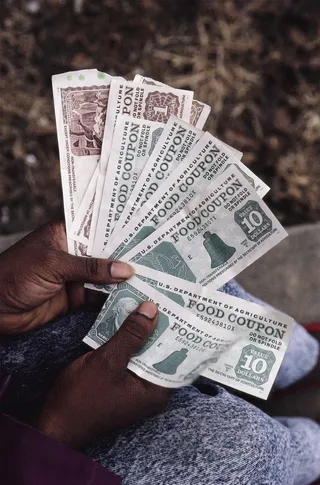Black America Is in the Red: A Breakdown of the Stats
Blacks continue to lag behind whites in the economy.

1 / 11
A Renewed Focus - The Joint Economic Committee has released a new report on the economic challenges faced by African-Americans and documents the economic barriers they face. It also includes state-by-state data on unemployment, poverty and median household incomes for Blacks and Whites. Although the statistics are not surprising, several members of the Congressional Black Caucus believe they can be used to bring a "renewed focus" to their work and level the playing field. — Joyce Jones (@BETpolitichick) (Photo: Courtesy of the Congressional Black Caucus)
Photo By Photo: Courtesy of the Congressional Black Caucus

2 / 11
No Surprises - "Today's report detailing the disparities that African-Americans face comes as no surprise to those who experience the reality of such inequities in their daily lives," said CBC chairman G.K. Butterfield at a press conference to present the report's findings. "Much of the country has experienced an economic recovery over the last six years, but there is still much work that remains and nowhere is this more evident than in the African-American community." (Photo: Chuck Liddy/Raleigh News & Observer/MCT)

3 / 11
Large Racial Gap - "The numbers are stark, they are troubling and they are unacceptable," said Rep. Carolyn Maloney (D-New York), ranking Democrat on the Joint Economic Committee. "What's especially concerning is that the already large racial gap in household wealth has grown even wider since the recession. This report is a powerful, sobering reminder that policymakers must do more to open doors of opportunity for African-Americans." (Photo: Brendan Smialowski/Getty Images)

4 / 11
Median Income - At $34,600, the median income of African-American households is nearly $24,000 less than the median income of white households ($58,300). In addition, the median net worth of white households is 13 times that of Black households.(Photo: Mario Tama/Getty Images)

5 / 11
Living in Poverty - Black Americans are almost three times more likely to live in poverty than white Americans. (Photo: Charles O'Rear/Corbis)
Photo By Photo: Charles O'Rear/Corbis
ADVERTISEMENT

6 / 11
Children in Poverty - Children in African-American households are nearly twice as likely to be raised in the bottom 20 percent of the income ladder as children in white households. More than 50 percent of Black families with children under 18 are headed by a single mother, compared to 19.1 percent of white families with children. Forty-seven percent of households headed by a Black single mother live in poverty. (Photo: Mario Tama/Getty Images)

7 / 11
Unemployment - The current unemployment rate for African-Americans is 10.1 percent. That is double the rate for whites and higher than the national unemployment rate ever reached during the recent recession. African-Americans also are 2.5 times more likely than whites to be long-term unemployed and two out of every five unemployed blacks have been searching for work for more than six months. (Photo: Mark Edward Atkinson/Blend Images/Corbis)
Photo By Photo: Mark Edward Atkinson/Blend Images/Corbis

8 / 11
The Millennials - Thirty-three percent of Blacks in their late 20s and one in five in their early 20s are unemployed. Just 21 percent of African-Americans aged 25 to 29 have completed at least four years of college, compared to 41 percent of whites in the same age bracket. (Photo: Martin Palombini / Corbis)

9 / 11
What Did I Go to College For? - Job prospects for Black college graduates are less optimistic than for whites and 5.2 percent of Black college graduates who've earned at least a bachelor's degree are unemployed compared to 2.9 percent of whites in the same category. The median weekly earnings of full-time Black workers who hold bachelor's degrees is about $900 compared to more than $1,100 for whites. (Photo: Blasius Erlinger/Corbis)

10 / 11
Housing - African-Americans who took out mortgages between 2004 and 2008 were almost twice as likely as white homeowners to have their homes foreclosed by 2011. In 2007, Black borrowers were three times more likely than white homeowners to have a subprime mortgage loan. One in 10 African-American homeowners who took out mortgages at the height of the housing boom also lost their homes to foreclosure. In 2007, Black borrowers were three times more likely than white homeowners to have a subprime mortgage loan. (Photo: Spencer Platt/Getty Images)
